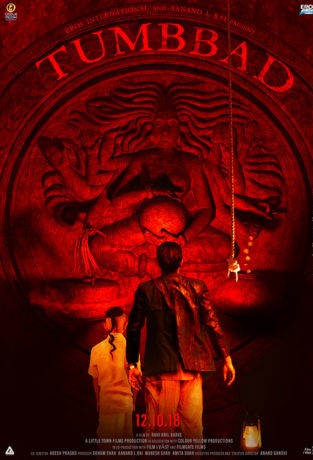 An example of new school Bollywood horror, meaning the music numbers and inflated runtimes of its predecessors are nowhere to be found. TUMBBAD (2018) does, however, contain a rich mythological—or, more accurately, devotional—underpinning. Inspired by conceptions originated by the Indian genre novelist Narayan Dharap, it was an ambitious, if troubled, production; credited to three directors, the film underwent just as many false starts and a top-to-bottom reshoot during its six year production. The results are quite streamlined, and TUMBBAD can boast of being the first-ever Indian film to open the Venice International Film Critic’s Week.
An example of new school Bollywood horror, meaning the music numbers and inflated runtimes of its predecessors are nowhere to be found. TUMBBAD (2018) does, however, contain a rich mythological—or, more accurately, devotional—underpinning. Inspired by conceptions originated by the Indian genre novelist Narayan Dharap, it was an ambitious, if troubled, production; credited to three directors, the film underwent just as many false starts and a top-to-bottom reshoot during its six year production. The results are quite streamlined, and TUMBBAD can boast of being the first-ever Indian film to open the Venice International Film Critic’s Week.
Tumbbad is an impoverished village cursed by the disgraced demon god Hastar. It’s here that in the early 1900s a woman grants sexual favors to Sarkar, the owner of a forbidding mansion where Hastar dwells, so she can provide for her two young sons Vinayak and Sadashiv. Also residing in the mansion is Sarkar’s ancient grandmother, who knows the location of a treasure hidden somewhere on the premises.
In short order Sarkar and Sadashiv both die suddenly, and Vinayak and his mother leave Tumbbad, with Vinayak promising to never come back. But fifteen years later Vinayak, now a debt-ridden young man, returns to further badger the grandmother, who has a tree growing out of her torso but is still conscious. She warns that going after the treasure will curse Vinayak just like she and her family have been cursed, but he’s overcome by avarice and insists on chasing down the loot.
This entails entering the “goddess’s womb,” a vast pit in the center of the mansion that leads to a fiery chamber. There demonic beings dwell that when agitated excrete gold coins. Vinayak manages to get ahold of some of those coins, which provide all the wealth he could possibly desire, but of course he finds himself wanting more. He brings his young son Pandurang along for a further spell in the goddess’s womb, which spells doom for both.
The sumptuous widescreen visuals and smooth narrative flow stand in stark contrast to the film’s troubled production history. The special effects aren’t bad either, being flashy yet subtle enough to let the thematic concerns predominate. Those themes are both timeless (the evils of unchecked avarice) and modern (the importance of female empowerment), and give the proceedings the feel of a classic morality tale. Yet like many Indian devotionals past and present, the film deals with concepts that may be difficult to grasp for anyone without a thorough knowledge of Hindi mythology.
I said there were no music numbers, but there are a few music video segues utilized to denote the passage of time (Bollywood, it seems, just can’t seem to get away from singing and dancing). The real problems occur in the scenes set in the goddess’s womb, which are strong and atmospheric, but drag on far too long and feature a great deal of repetitive visuals. Otherwise, though: bravo!
Vital Statistics
TUMBBAD
Eros International/Colour Yellow Productions/Film I Vast/Filmgate Films
Director: Rahi Anil Barve, Anand Gandhi, Adesh Prasad
Producers: Sohum Shah, Aanand L. Rai, Mukesh Shah, Amita Shah
Screenplay: Mitesh Shah, Adesh Prasad, Rahi Anil Barve, Anand Gandhi
(“Inspired by the works of” Narayan Dharap)
Cinematography: Pankaj Kumar
Editing: Sanyukta Kaza
Cast: Sohum Shah, Jyoti Malshe, Anita Date, Ronjini Chakraborty, Deepak Damle, Cameron Anderson, Dhundiraj Prabhakar Jogalekar, Madhav Hari Joshi, Piyush Kaushik, Harish Khanna, Anika Radhakrishnan, Arohi Radhakrishnan, Mohammad Samad, Rudra Soni
